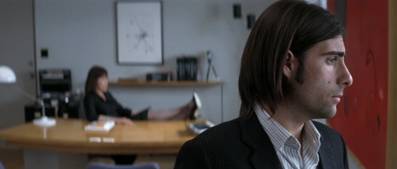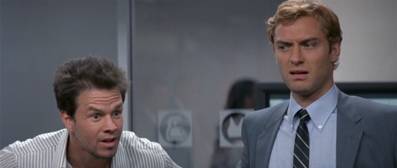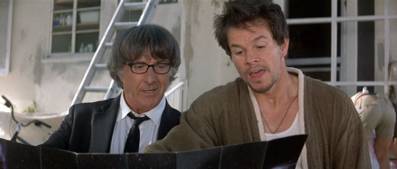| Existentialism |
A (mostly) twentieth-century approach that emphasizes
the primacy of individual existence over any presumed
natural essence for human beings. Although they
differ on many details, existentialists generally
suppose that the fact of my existence as a human
being entails both my unqualified freedom to make
of myself whatever I will and the awesome responsibility
of employing that freedom appropriately, without
being driven by anxiety toward escaping into the
inauthenticity or self-deception of any conventional
set of rules for behaviour, even though the entire
project may turn out to be absurd. |
www.philosophypages.com |
Above
is the primary philosophy that I ❤ Huckabees hinges upon, as it is the journey of a handful of people
searching for a sense of self via an existential detective
service, and I find this definition most appropriate in
describing what much of the film is about.
This
film does not lend itself well to a simple synopsis, but
the general outline is as follows; Albert Markovski (Jason
Schwartzman) is an environmentalist who enlists the help
of Bernard (Dustin Hoffman) and Vivian Jaffe (Lily Tomlin),
existentialist detectives, after a series of co-incidences
involving a tall "African guy." Their examination
leads them to Albert's work, where his charter to help
save "the open spaces" is set be taken over
by a member of the Huckabees corporation, Brad, played
by Jude Law. As the investigation continues Albert is
teamed up with a fire fighter called Tommy (Mark Wahlberg)
who is also striving to find meaning in his life, post
9/11. He has found an alternative philosophical approach
in a book by French nihilist, Caterine Vauban (Isabelle
Huppert), who is tracking the whole group's movements
without any of their knowledge. Still following?! Dawn
(Naomi Watts), Brad's girlfriend, is the last to enlist
the help of the detectives, by which point everyone else's
quest to find themselves has somewhat put them at odds
with each other and themselves. Eventually the two camps
of contrasting extremes of philosophy reconcile, helped
by the journeys of their clients.

Okay,
so that may sound somewhat convoluted, but one would be
surprised how well it works in practice. David O. Russell
uses many devices to create a film with very deep base
meanings without getting boring for a moment. The pacing
is for the most part at breakneck speed, the initial bombardment
of information ensuring the audience is always on its
toes, in true detective movie style constantly keeping
you one step behind exactly what is going on. This is
a great narrative device, generating an element of chaos
to add to the chaos of the editing pace. To balance this
out, the mise en scene is pristinely ordered. The angular
and minimalist sets have been designed meticulously in
manner of tone and colour, to create the exact right environment
for the characters to move in. From the surrealist paintings,
ornamental melons and existentialist blackboard equations
of the detectives' offices to the high commercial icons
(Shania and Pete Sampras cut-outs etc) and notices of
the Huckabee building, attention to detail is as important
on screen as it is in the highly intricate script. There
are also forays into Magritte style surrealism in the
form of Albert's abstract psyche, realised through the
use of digital technology. I have misgivings about CGI,
although here it is a help rather than a hindrance, an
intensification of the film's themes rather than an excuse
to curb creativity in favour of stylistics, as is the
case with much modern cinema. It is also used as the flip
side to Albert's chaotic mind as Huckabees' ordered poster
designs, rendered in mock 3D; a connotation of corporation
sensibilities and their attempt to appear sincere in helping
the public, when in fact they have more capitalist motives.
It
is useful to note at this point that Russell himself was
an activist before he became a filmmaker, and this a very
personal work for him. The digs at capitalist society
range from the subtle to the down right explicit, as do
all of the messages in this film, (an especially interesting
theme is that of the corporation as religion – when Watts'
character refers to Huckabees as "fuckabees,"
it is registered as practically blasphemous). Every one
of these barbs are delivered with a venomously personal
touch rare in the writing of modern mainstream American
film, although, it is contentious to even suggest this
to be a commercial movie. Just because of the widespread
popularity and high profile of Russell's previous film, Three Kings, does not mean one can assume
his next offering would be targeted at the same audience. Huckabees is a much too diverse picture
to enjoy the success of its predecessor, sadly.
The
effectiveness of the piece is helped by the inspired casting
and performances from the ensemble cast. Schwartzman is
superb as Albert, and Russell did well to pick him for
a lead role following his turn alongside Bill Murray in
Wes Anderson's Rushmore (1998). His performance
here put me in mind of the young Hoffman in The
Graduate (1967), which Schwartzman himself sites
as an inspiration for the role. He is complimented beautifully
by the impeccably unusual assortment of supporting roles.
Dustin Hoffman is highly charged and quirky, a real return
to form from a great actor who for a while seemed to have
lost his way. This is a perfect antidote for him playing
a comedy role to that of the same year's Meet
The Fockers, which is much less of a movie. Lily
Tomlin works perfectly next to Hoffman, and a real screen
chemistry between them is clear. Then we have Law's great,
just subtle enough, caricature of a businessman eager
to climb the corporate ladder, and Watts, hot out off
the shoot of 21 Grams, convinces in her
first comedy role, and Isabelle Huppert does a fine job
of exuding an aura of deadpan calm. Although all of these
parts are played pitch-perfect, it is Wahlberg who steals
the show for me. From the first scene he appears in, he
rips through the movie like a man possessed, and accomplished
changing my view of him as a somewhat run of the mill
poster boy, to an actor with great comic awareness and
ability. What all of these great characters/actors do
is create situations onscreen where all concerned are
figuratively chewing up the set with their performances
and it's a well played juggling act on the part of Russell
to control these scenes, no doubt down his unique way
of directing, the hard work put in at pre-production and
the intimate working atmosphere he takes care to cultivate
on set.

These
characters are confused and disorientated, as is the audience,
by this barrage of theory and questioning of the self,
so identification with the protagonists is not difficult
to establish. The tremendous energy thrown into each part
significantly adds to the intensity of what Russell wants
to bring across, although philosophical tirades by Hoffman
and moral outbursts (mostly about "the petroleum
situation") by Wahlberg, can sometimes be a little
difficult to assimilate before the next narrative curveball
is thrown, adding to the relentless feeling of running
to keep one sep behind the aggressive pace. This is denoted
explicitly with the physical movement of the characters.
Albert's journey in his mind is reflected by his constant
physical movement. Walking, running, cycling etc, even
when he is standing still there are gestures or nervous
ticks. He has very few still moments, as does the whole
movie. Actually, all characters conform to this. They
are all moving, searching, following, going from A to
B, the characters' transitions are constant. Even Huppert's
composed character still is still moving, tracing the
movements of all the others. The only true period of stillness
is at the end where a resolution has been reached, and
the case is closed.
There
are some wonderfully quirky moments, born out of improvisation
by the likes of Schwartzman, Wahlberg and the Tomlin/Hoffman
team, all at such ease with their roles they inhabit them
so fully their personalities spill beyond the script.
When Albert is asked by Vivian if he has ever "transcended
time and space", he answers: "Yes..no…time
not space. No I don't know what you're talking about."
Words on a page cannot describe the hilarity of Schwartzman's
delivery of that line, and it has become one of my favourite
film quotes.
The
music accompanying this is by Jon Brion, a Paul Thomas
Anderson regular poached by Russell (he also composed
the score for Eternal Sunshine of the Spotless
Mind the same year). Brion's experience with
off-the wall-directors is a clear benefit here as his
style is perfectly in keeping with the playfulness of
the movie, and it is clear Russell worked closely with
him to get exactly the right tone for every scene (which
is detailed in one of the DVD extras, see below). It is
one such score that is so seamless that on first watch/listen
one can easily miss it if not keeping a trained ear out.
With all the rest going on, it is just another string
to the Huckabees bow that gets assimilated
favourably within the form, as all good scores should.

With
regards to the main narrative thrust, it is impossible
in a humble review to cover in any detail all of the elements
of this film when it comes to philosophy. As Russell has
drawn from so many different influences and theories it
would become somewhat complex to delve into the finer
points of, say, quantum mechanics or Satre's take on existentialism.
There are hints of all of this in what is thrown at you
during the film. Russell's "cubes and cracks"
debate, backed up by another unusual and innovative use
of CGI, is a broad simplification a particular theory,
made easy for the average viewer. Although, for those
who are not philosophically minded it is still difficult
at times to keep up with the theories banded about in
the course of the picture. There is nihilism from Caterine,
Zen, Freud and Satre from Bernard (not to mention Magritte),
mixed up with moral and political theorising and indignation
from Tommy and Albert. These are to name but a few influences
drawn upon for Russell's movie, and are all clearly interests
of his personally. Here it would be nice to offer up the
possibility of an auteur tag, as Russell's personal stamp
is crawling all over this film (if stamps can crawl!).
This is of course problematic, as he does not have a sufficient
body of work to have earned that troublesome, though sought
after, label. Although, this is a good indication of things
to come, and one is caused to wonder if we have a Scorsese-style
relationship with the industry in the making (i.e. a one
movie for a big studio to fund the making of a more personal
feature, type plan; as in, one for you – the industry
– and one for me – independent), or maybe a Spike Jonze-like
indie-wood position. One can only wait and see. But I
think one thing is certain, keeping an eye on David O'
Russell will be beneficial.
Framed
2.35:1 and anamorphic, this is a film that offers some
challenges for DVD transfer in its very deliberate use
of blank, undecorated walls, many of which are the very
shade of grey that often seems to present a breeding ground
for compression artefacts. On the whole the transfer copes
well here (though some are still occasionally visible),
and the sharpness, contrast and colour reproduction are
bang on, as you'd expect from a big studio release of
a modern American film of even moderate budget.
The
5.1 soundtrack is a resolutely unflashy affair, sitting
for the large part at the front and having little to wake
up the subwoofer, though music is sometimes more inclusively
spread. This approach does allow the film a rare surround
sound gag, though – when Albert's father insists on showing
off his new stereo system that has "speakers everywhere,"
Shania Twain's Feel like A Woman comes at you
from every direction, just as it would on Albert's Dad's
stereo system. Full marks for that one.
There
are two commentary tracks on
this disc, one with just David O. Russell, the other on
which he is sporadically joined by Jason Schwartzman,
Mark Wahlberg and Naomi Watts. They are both packed with
fascinating information about the film, with the first
one obviously having emphasis on the writing and directing,
the second exploring similar territory with the actors
chipping in on their performances etc. The second is somewhat
edited and at times it is a little confusing regarding
who is talking, as Wahlberg and Schwartzman flit in and
out. Naomi Watts makes a brief appearance by way of a
phone connection to discuss the scene in which she and
Law talk to the detectives in their kitchen. She adds
something to the feature but nothing particularly useful.
Schwartzman is the most interesting of the actors talking
here, and has a lot to say about how Hoffman guided him
through his role and gave him handy tips. Russell is,
as always, enthusiastic, and name drops many philosophers
who inspired the film as well as doing a little of the
old "Oh, he was sooo great," business that I'm
not too keen on. There are a few comic exchanges only
to be expected with this lot, which is a welcome injection
of comedy lacking in many commentary tracks.
The
half hour production documentary (34:40) is good for seeing how Russell works on set, and
has a few interesting interviews with cast members during
production. It does suffer from being a bit cobbled together,
although it has a nice immediate feel to it. The worst
thing is the irritating off camera geek voice of the interviewer
(and maybe director, I don't know), whose nasal "yeah"s
of agreement and other pointless expressions began to
grate after a while and I was beginning to wish he'd just
shut up and let the people speak! Russell is charismatic
and Hoffman an unexpected comedian. They all look like
they had a great time making the movie, with the highlight
possibly being the prosthetic breasts displayed by a few
of the male cast!
A
standard addition to any good DVD is the extended/deleted
scenes (17:54) section, and here we have
some of each. Mostly this serves to highlight the space
actors are given to move around the script under Russell's
command, with extended and alternative takes of some scenes
and Albert's fight in the elevator extended to its painful
entirety. There is also an outtakes section, registering
in a comical fashion how many takes it took to perfect,
let's say, the shot in which Brad is pushed to the floor
by Tommy. A fun, yet not fundamentally informative addition
to the disc.
The
same goes for the next feature, entitled Miscellaneous
Things People Did (4:31). This piece is
yet another elaboration on the "Gee, its great to
work with David O. Russell" feeling exuded a little
too much by most of these novelties.
Following
that there are some fun 'PSAs' and commercials for the open spaces charter, with Albert doing his thing.
But it's the half-hour long infomercial that I really enjoyed. It has the Jaffes (Tomlin and Hoffman
in character) hosting a programme with two leading doctors
of science and philosophy, who they interview at some
length about an abstract spectrum of philosophical theory.
Quantum mechanics is touched upon with some mention of
the tenth dimension, but I found it a little disjointed,
although fascinating. The way the thing is put together
is the best thing about it, almost as interesting as the
film itself, with playful movement in subtleties of the
mise en scene and musical interludes by Jon Brion himself,
all parodying the kitschness of the infomercial format,
as well as bringing in the surreal Huckabees style.
Finally
there is Jon Brion's Knock Yourself Out music
video (2:04) is non-anamorphic 1.85:1 and
has the singer strumming his song on a sparse set, supported
by some straight-faced tomfoolery from Jason Schwartzman
and Mark Wahlberg (you heard). I'm taking a guess this
was directed by Russell.
Despite some reviews to the contrary, I believe this is
a perfectly executed, oddball comedy with an unusual,
even original, use of philosophical theory as the driving
force at the core of its narrative. Although I understand
how a film such as this could prove a little hard to swallow
for some, I recommend it to anyone with an intellectually
playful nature, or just a lover of independent cinema
done with a little more wallet. But those of you who don't
like pacy, witty, well made movies with a little more
substance than your average Hollywood comedy need not
worry themselves about transcending time and space for
this experience.
|